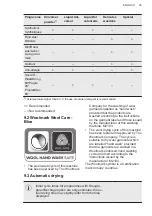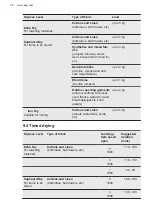
16.7 Items not suitable for
drying
Do not set a drying programme for
this laundry:
• Synthetic curtains.
• Pieces of clothing with metal inserts.
• Nylon stockings.
• Quilts.
• Bed covers.
• Duvets.
• Anoraks.
• Sleeping bags.
• Fabrics with residue of hair sprays,
nail solvents or similar.
• Garments with foam-rubber or
materials similar to foam-rubber.
16.8 Garment labels
When you dry the laundry, obey the
indications on the labels of the
manufacturers:
•
= The item can be tumble dried
•
= The drying cycle is at high
temperature
•
= The drying cycle is at reduced
temperature
•
= The item can not be tumble
dried.
16.9 Drying cycle duration
The drying time can change depending
on:
• speed of the last spin
• dryness level
• type of laundry
• weight of the load
16.10 Additional drying
If, at the end of the drying programme,
the laundry is still damp, set a short
drying cycle again.
WARNING!
To avoid creasing and
shrinkage do not overdry
the laundry.
16.11 General Tips
Refer to the «Drying programmes» table
to find the average drying times.
Experience will help you to dry the
laundry better. Take note of the duration
of the cycles done before.
To avoid the static charge at the end of
the drying cycle:
1. Use fabric conditioner in the washing
cycle.
2. Use special fabric conditioner for
tumble dryers.
When the drying programme is
completed remove the laundry promptly.
17. CARE AND CLEANING
WARNING!
Refer to Safety chapters.
17.1 Periodic cleaning
schedule
Periodic cleaning helps to extend the
life of your appliance.
After each cycle, keep the door and the
detergent dispenser slightly ajar to get air
circulation and dry the humidity inside
the appliance: this will prevent mildew
and odours.
If the appliance is not used for a long
time: close the water tap and unplug the
appliance.
Indicative periodic cleaning schedule:
Descaling
Twice a year
Maintenance wash
Once a month
Clean door seal
Every two months
Clean drum
Every two months
Remove fluff inside
the drum
Twice a month
1)
ENGLISH
39














































